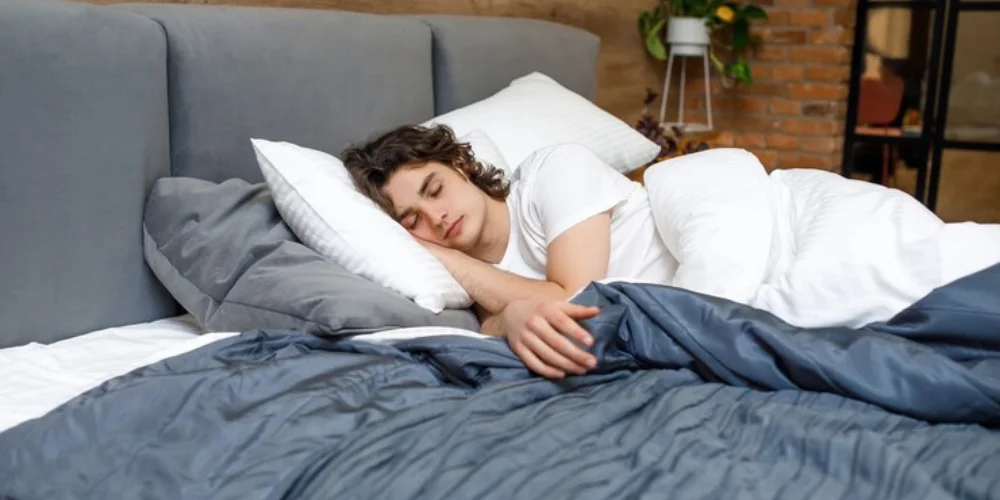Top 20 Tips to Improve Your Sleep When Times Are Tough
Sleep is necessary for our overall health and well-being, but increasing restful sleep can be challenging during difficult times. Factors such as stress, anxiety, and overwhelming conditions can disrupt sleep quality, making it harder to wake up refreshed. Here are the top 20 tips for enhancing sleep quality, especially when life is complicated. Follow these practical tips to improve sleep habits, improve sleep patterns, and enhance sleep quality.
Create a Relaxing Sleep Environment
Your bedroom should be a shelter designed for relaxation and ease. To get better sleep, start by decluttering your room—clear away unnecessary items to make a calming space.
Next, invest in blackout curtains to block interior light and a sound machine to mask the noise. Consider adding a fan or air cleaner for white noise and air circulation, improving better sleep grade
Maintaining a comfortable temperature is also critical; the ideal room temperature for most people is between 60-67°F (15 and 19°C). Opt for comforting colours like blue, grey, or pastel shades for your bedroom décor, as these dyes promote better night rest.
Choose a mattress and pillows that offer suitable support for your sleeping position, whether it’s side, back, or stomach sleeping. Better sleep routines begin with setting up the right environment!

Stick to a Consistent Sleep Schedule
Moving a bed and waking up simultaneously daily helps regulate your internal body clock, making it easier to fall asleep and wake up recharged. Try to maintain a similar sleep plan on weekends to avoid disrupting your natural rhythm.
A consistent sleep plan improves better sleep quality because your body adjusts to a routine, removing sleep-inducing hormones like melatonin at the right moments. If you’re having trouble falling asleep, resist the want to stay up later. Instead, bring up and do a soothing activity like reading or listening to peaceful music until you feel relaxed.
Limit Screen Time Before Bed
The blue light radiated by smartphones, tablets, and laptops can interfere with melatonin production, making it difficult to fall asleep sincerely. To combat this, specify screen time to be at least one hour before bed. Instead of scrolling through your phone, employ calming movements like reading a physical book or practising deep breathing.
If you must use electronic devices at night, consider using blue light filters or blue light-blocking glasses to decrease exposure. Turning on your device’s “night mode” can also help minimize blue light effects. This nominal adjustment can contribute significantly to better sleep habits and improved sleep rate.
Use Relaxation Techniques
Relaxation techniques such as meditation, deep breathing, or progressive muscle relaxation can help you relax your mind before bed. Meditation involves sitting quietly, concentrating on your breath, and observing your thoughts without judgment. Deep breathing exercises involve taking slow, deep breaths to reduce tension and anxiety.
Another effective method is muscle relaxation, which involves tensing and slowly releasing each muscle group in your body, starting from your toes and working your way up. These techniques are great for improving better sleep quality and managing stress and anxiety.

Pay Attention to Diet and Hydration
What you eat and drink before sleeping can affect how well you better sleep. Light meals, spicy foods, and alcohol can cause discomfort and disrupt sleep. Try to have your last meal at least 2-3 hours before bedtime. If you’re hungry closer to sleep, opt for light snacks like bananas, almonds, or warm milk, which encourage better sleep.
Staying hydrated is essential, but try to limit fluid intake an hour or two before bed to avoid waking up for bathroom breaks. These dietary adjustments can help you attain restful sleep and improve your sleep habits.
Exercise Regularly
Regular exercise is one of the most valuable ways to increase sleep patterns. It decreases stress, alleviates anxiety, and weakens the body, making better sleep more comfortable. However, avoid vigorous exercise within three hours of bedtime, as it can have the opposite effect and make it harder to wind down.
Aim for 30 minutes of moderate physical activity daily, such as brisk walking, jogging, or cycling. Exercise releases endorphins that enhance mood and reduce anxiety, contributing to better sleep routines.
Manage Stress Effectively
Stress management is essential for better sleep habits. Techniques such as journaling, talking to a trusted friend, or practising mindfulness can help reduce the mental clutter that often keeps you awake at night.
Mindfulness meditation includes focusing on the present moment without judgment, which can relax an overactive mind. Alternatively, journaling before bed allows you to express anxieties, ideas, and to-do lists, releasing your mind for sleep. Decreasing stress naturally leads to restful sleep.

Adjust Room Temperature
The temperature of your bedroom can significantly impact your sleep rate. Sleeping in a more relaxed room, generally between 60-67°F (15-19°C), can help you fall asleep faster and nap longer. You can use a fan, modify your thermostat, or open a window for ventilation.
If the room is too cold, consider using a warm blanket or heated mattress pad to keep comfort without overheating. Finding the right balance can enhance sleep habits and improve sleep patterns.
Use Aromatherapy
Aromatherapy with vital oils like lavender, chamomile, or sandalwood can create a relaxing environment that promotes restful sleep. You can use essential oils in a diffuser, apply them to your wrists, or add a few drops to your pillow before bed.
Lavender, in particular, is known for its calming effects and has been shown to improve better sleep quality. Chamomile has similar effects and can be ingested as a tea for a calming bedtime habit.
Try White Noise or Soothing Sounds
White noise machines, soft music, or natural sounds like ocean waves can mask disruptive noises and create a relaxing atmosphere for better sleep. If you’re a light sleeper, white noise can be a game-changer.
Experiment with different sounds to find what works best for you. Many apps offer a variety of calming sounds, making it easy to set up an optimal soundscape for sleep.

Avoid Naps After Midday
While short naps can increase energy during the day, long or late naps can disrupt your night sleep. If you need to nap, try to limit it to 20-30 minutes and take it morning of the day, ideally before 2 p.m.
Short naps can help you recharge without interfering with your nighttime sleep patterns. This approach helps ensure you sleep nicely when it counts most—at night.
Limit Alcohol and Caffeine
Alcohol and caffeine are two of the most significant wrongdoers of poor sleep quality. Caffeine, a stimulant found in coffee, tea, chocolate, and energy drinks, can stay in your system for up to 8 hours, making it harder to fall asleep. To improve sleep quality, try to avoid caffeine intake after 2 p.m.
Alcohol, though it might make you feel sleepy initially, actually disrupts deep sleep cycles. It’s best to limit alcohol consumption, particularly in the evening, to promote more profound, more restful sleep.
Incorporate a Pre-Sleep Routine
Developing a pre-sleep routine signals your body that it’s time to wind down. This routine could include reading a book, extending for a few minutes, or even taking a warm bath. It helps relax your muscles, reduce stress, and prepare your body for better sleep.
The key is to choose exercises that relax you and do them in the same order every night. Over time, your body will associate these activities with sleep, making falling asleep faster and gaining restful sleep easier.

Get Sunlight Exposure During the Day
Natural sunlight exposure during the day helps control your body’s circadian rhythm, leading to better sleep at night. Aspire to get at least 30 minutes of sunlight direction each day, ideally in the morning.
If getting natural sunlight isn’t possible, consider using a light therapy box. This device mimics natural daylight and can help improve sleep patterns and mood, especially during darker months.
Use Sleep-Enhancing Supplements
Certain accessories can help improve sleep quality. Melatonin, a hormone that holds sleep cycles, is widely used as a sleep aid. Magnesium, another supplement, helps relax nerves and calm muscles, making it easier to achieve restful sleep.
Valerian root, passionflower, and chamomile supplements have also shown benefits in encouraging better sleep. However, always consult a healthcare provider before beginning any new supplement to ensure safety and energy.
Make Your Bed Comfortable
A comfortable bed is crucial for better sleep habits. Your mattress should support your body and not cause distress or pain. If your mattress is over 7-8 years old, it might be time to consider a replacement.
Invest in quality pillows that cater to your sleeping position, whether you’re a side, back, or stomach sleeper. Soft, breathable bedding provides a more comfortable and restful sleep climate.

Limit Fluid Intake Before Bed
Waking up for regular bathroom breaks can interrupt your sleep cycle. To achieve deep sleep, limit your fluid intake an hour or two before bed. This can minimize the chances of waking up in the centre of the night.
Drinking a small amount of water before bed is fine, but avoid drinking large quantities that might guide you to nocturnal awakenings.
Use Visualization Techniques
Visualization is a powerful technique for managing and preparing your mind for better sleep. To practice visualization, close your eyes and imagine a serene and peaceful place, like a beach or a quiet forest. Focus on the details—how the environment looks, feels, and sounds.
This process can distract your mind from worries and anxieties, making it easier to drift asleep. When done regularly, visualization can become one of the most effective deep sleep techniques for enhancing overall sleep quality.
Manage Health Conditions
Sleep issues can sometimes be connected to underlying health conditions like sleep apnea, stress, or depression. If you’re sharing chronic sleep problems despite trying these tips, it may be beneficial to consult a healthcare professional.
Sleep apnea, for example, is a common but serious condition that disrupts breathing during sleep. Proper diagnosis and treatment can significantly improve better sleep quality. Additionally, treating anxiety or depression with therapy, medication, or lifestyle changes can lead to better sleep patterns.

Stay Positive About Sleep
Your mindset about sleep plays a significant role in your ability to get better sleep. Stressing about not sleeping well can create a cycle of anxiety that further disrupts your sleep. Instead, focus on the positive aspects of your sleep journey.
Remind yourself that you are making changes that will improve your better sleep over time. A positive attitude toward sleep can help create a more relaxed approach to bedtime, making falling and staying asleep easier.
Conclusion
Achieving restful sleep when times are tough can be challenging but not impossible. You can significantly improve sleep quality by making small, consistent changes to your sleep routine, environment, and daily habits. Implementing these top 20 tips will help you sleep better, even in the face of stress and uncertainties.
The key to better sleep is consistency—maintaining a routine, managing stress effectively, and creating a sleep-friendly environment. Whether sticking to a regular sleep schedule, limiting screen time, or trying relaxation techniques, each step contributes to better sleep habits. Remember, improving sleep quality is a gradual process that requires patience and dedication.
Recent Post
-
 Top 20 Tips to Improve Your Sleep When Times Are Tough
Top 20 Tips to Improve Your Sleep When Times Are Tough -
 Boost Your Mental Health with Mindfulness and Meditation Practices | Tips 2024
Boost Your Mental Health with Mindfulness and Meditation Practices | Tips 2024 -
 Stress Management Tips and Tricks | 100% Best Solutions of Stress
Stress Management Tips and Tricks | 100% Best Solutions of Stress -
 Depression and Anxiety | 10 Best Treatments for Depression & Anxiety
Depression and Anxiety | 10 Best Treatments for Depression & Anxiety -
 Weight Lose Fast: Scientific and Sustainable Lose Weight Top 15 Tips
Weight Lose Fast: Scientific and Sustainable Lose Weight Top 15 Tips -
 Transform Your Health with Expert Nutrition & Diet Tips
Transform Your Health with Expert Nutrition & Diet Tips -
 #1 Natural and Medical Treatments for Sleep Disorders: A Complete Guide
#1 Natural and Medical Treatments for Sleep Disorders: A Complete Guide -
 #1 Enhance Your Energy with These Exercise and Fitness Tips
#1 Enhance Your Energy with These Exercise and Fitness Tips -
 Choosing Why Sleep Is Important for Cognitive Health
Choosing Why Sleep Is Important for Cognitive Health -
 Tips for Improving Mental Health and Well-being
Tips for Improving Mental Health and Well-being -
 How to Improve Your Physical Health for Overall Wellbeing
How to Improve Your Physical Health for Overall Wellbeing
